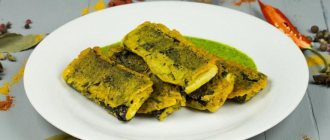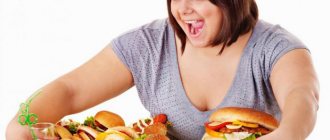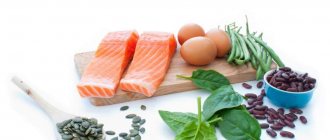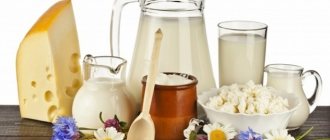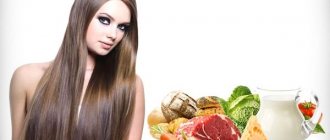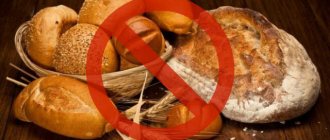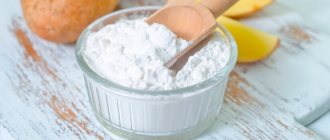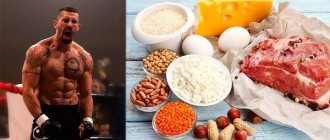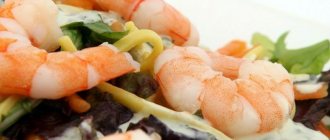Vegetarianism as a way of eating and even a way of life is gaining more and more fans today. It no longer surprises anyone if in a group at the table someone abstains from meat or dairy products, or if one of your guests prefers salad to steak. We are increasingly seeing vegan-friendly dishes on the menus of cafes and restaurants; store shelves are rushing to offer a wide selection of products and goods that do not contain animal ingredients.
However, while vegetarianism has long been a trend in the West, in our country people have very vague ideas about what exactly a vegetarian diet consists of, and treat this food system with suspicion and distrust. But this is one of the most ancient types of food, which is many thousands of years old. Such ignorance gives rise to a lot of myths that spread across the Internet and continue to mislead people about the benefits and harms of vegetarianism.
We all periodically come across halivars online between “meat-eaters” and vegetarians, accusing each other of all mortal sins. If you are a beginner vegetarian or are just about to try this type of diet, these online showdowns will confuse you even more. I often see that many, having become vegetarians, go to great lengths without fully thinking through their daily menu. But such frivolity can undermine a person’s health – sometimes irreversibly. Therefore, it is important to understand the following questions: what does vegetarianism include and what types does it come in? How to switch to a vegetarian diet correctly? How to get all the necessary substances with such a diet (and not die of hunger)? And the most interesting thing: WHERE DO VEGETARIANS GET PROTEIN? Let's figure it out.
Types of vegetarianism
Vegetarianism is a food system in which all products of animal origin (meat, fish, chicken, seafood, etc.) are excluded from consumption. A similar practice of conscious dietary restriction can be found in the history of many peoples, but the term “vegetarianism” itself was officially assigned to this movement on September 30, 1847, when the Vegetarian Society of the United Kingdom was founded in Ramsgate in England. It still exists today, famous members of this Society are Mahatma Gandhi, J. Bernard Shaw, Paul, Linda and Stella McCartney. To name a person who practices this type of nutrition, the English term “vegetarian” was chosen, which, according to some sources, comes from the Latin “vegetus” - “vigorous”, “fresh”, “alive”, and according to others - from the English word vegetable (vegetable).
Vegetarianism can be strict - then it is called veganism or veganism . With this type of diet, absolutely everything that contains animal components is excluded: in addition to meat, poultry, fish and seafood, eggs, all dairy products and honey are not consumed. Veganism is more than just nutrition, it is a way of life, the main principle of which is the absence of any exploitation of animals for the sake of humans (even if the animal is not killed). Therefore, vegans do not wear leather, wool and fur products and shoes made from these materials, and do not consume products tested on animals, as well as substances such as glycerin, gelatin, etc.
Other types of vegetarianism are much less ascetic: ovo-, lacto-lacto-ovo-vegetarianism. With lacto-ovo vegetarianism , eggs and dairy products remain in the diet; Ovo-vegetarianism excludes dairy products, and lacto-vegetarianism , accordingly, excludes eggs. In all three systems, honey is usually used. There is also pescatarianism , when fish and seafood are left in the diet, and only warm-blooded meat is limited.
There are several more extreme options for veganism: raw food diet and fruitarianism , which we will not consider in this article. I will only say that I cannot call these types of nutrition complete and healthy and I advise you to treat them very carefully, as they can cause serious harm to the body.
Vegetarian philosophy
This trend is widespread in the world. However, in some countries it is a real cult. A similar thing is observed in India. Vedic laws state that people have no right to take the life of other living beings, since killing for food seriously violates God's laws. Russian vegetarians and adherents of this system in other countries adhere to the same position. Answering the question of how many such people there are in Russia, statistics claim that about 4% of citizens practice vegetarianism.
Vegetarianism plays an important role in world religions - such as Buddhism, Hinduism, Jainism. As for how Orthodoxy relates to this movement, Christianity does not formulate a clear attitude towards it. The Bible contains a number of quotes that adherents of plant foods interpret as a call to vegetarianism. However, the essence of vegetarianism differs from the essence of Christian fasting.
For the majority of those who practice vegetarianism, this system is not just a special diet, but a certain philosophy of life. They adhere to it, guided by ethical and moral principles.
The essence of ethical principles is that killing for food cannot be acceptable. Spiritual beliefs are that food has positive or negative energy, which it is “saturated” with during the process of extraction and preparation. And if an animal experiences fear when dying, then the meat dish will also have negative energy.
This philosophy involves not only abstaining from animal food, but also eliminating bad habits from life. Smoking, drinking alcohol - all this is not for true adherents of this system. In addition, they do not wear leather shoes, fur, and do not accept anything related to the suffering of animals.
Famous people have written a lot about vegetarianism in different historical periods. The ancient Greek philosopher Plato noted that meat consumption leads to unwise use of land.
Leo Tolstoy also wrote a lot about vegetarianism, noting that consuming exclusively plant foods allowed him to feel healthier and stronger compared to people his age.
Our contemporaries confirm this. The famous journalist Alexander Nevzorov, presenters Nikolai Drozdov and Olga Shelest, have been practicing this lifestyle for many years; Mikhail Zadornov was a convinced vegetarian.
Even the appearance of some famous people is clear evidence that a vegetarian lifestyle benefits them. For example, the famous actor Jared Leto looks much younger at forty-seven.
Although there are many similar examples, the World Health Organization (WHO), which is the main guide in the field of health, does not speak out either for or against vegetarianism. This diet plan is allowed if it fits into the general nutrition recommendations.
Reasons for transition and statistics
People become vegetarians for various reasons, the main ones being:
- ethical (the principle of non-violence (Sanskrit “ahimsa”), out of compassion for other living beings);
- religious (some religions, for example, Hinduism, prohibit the consumption of meat; also, in many religions there are fasts (for example, in Christianity) - temporary refusal of certain foods);
— environmental (there is evidence that about 30% of greenhouse gases on the planet are formed due to the activities of livestock farms and the infrastructure that serves them; in addition, tropical forests, the “lungs” of our planet, are subjected to severe deforestation, and wastewater from slaughterhouses pollutes rivers and soil);
- economic (approximately 40% of all grown grain goes to feed livestock bred for slaughter, and reducing this figure by at least half can solve the problem of hunger on earth; also, for the purposes of livestock farming, a huge amount of water is spent - one of the most valuable resources on the planet );
- medical (a vegetarian diet can reduce the risk of cardiovascular diseases, some types of cancer, gastrointestinal diseases, etc.).
Vegetarianism is most common in India (about 84% of the population) and Taiwan (14%). From 5 to 10% of vegetarians are found in Brazil, Israel, Italy, Germany, Great Britain, 9% in Sweden, 6% in the Netherlands and Norway, 4% in the USA, less than 5% in Spain, France, Australia, New Zealand. Zealand, Poland and the Czech Republic. In Russia in 2013, there were about 4% of convinced vegetarians (according to a survey conducted by the Superjob portal), and 55% of respondents stated their approval of the position of vegetarianism.
There are certain difficulties that people face when switching to a vegetarian diet. Let's look at them in more detail.
Protein deficiency
The very first question a newly-made vegetarian hears is: “Where do you get your protein?” With a standard diet, we get approximately 38-33% protein per day from meat and meat products. With a vegetarian diet, these percentages must be properly replenished from plant and/or dairy foods and eggs. Despite the fact that there is a lot of protein in cereals and legumes, it is not easy for our body to absorb. Below I will provide a table of the content and digestibility of protein from various foods.
Pay attention to the following columns:
— the amount of protein in grams per 100 g of product (this way you can estimate how much protein you will eat from a serving of a protein product);
- digestibility in % (shows how efficiently the average person digests this or that type of protein - here you need to make allowances for your own body, because we are all unique);
- biological value (BC - the percentage of utilization of protein entering the body. Whey protein and eggs are utilized by the body by 100%, milk - by 93%, rice by 86%, casein, fish and beef - by 75%, corn - by 72%, grain gluten – by 44%);
- protein absorption coefficient PDCAAS (or also called adjusted amino acid score. This indicator includes three main parameters: the content of essential amino acids, protein digestibility and the ability to supply essential amino acids in the quantity required for a person. If it is equal to 1, then this is the “best " according to these three indicators protein).
We see that the protein with the highest absorption rate is eggs, egg powder, whey and dairy products (milk, kefir, cottage cheese, cheese). If we exclude powdered eggs and whey from the list, which we don’t eat in normal life, then the most effective foods for protein will be cottage cheese, cheese and eggs. Of the plant products, the most valuable in terms of protein intake and processing by the body will be soybeans (the absolute leader), beans, peas, buckwheat, rye and corn. Therefore, it is better to focus on these foods in your diet.
Thus, the protein diet for a girl weighing 60 kg will be something like this:
- 2 eggs (approximately 90 g serving = 11.43 g protein)
- glass of kefir (approximately 200 g = 5.6 g protein)
- 150 g buckwheat (= 18.9 g protein)
- 2 slices rye-wheat whole grain bread (about 50 g = 5.45 g protein)
- 100 g cottage cheese (approximately 17 g protein)
One of the difficulties of a purely plant-based diet (veganism) is amino acid imbalance . The fact is that plant proteins have an incomplete composition of amino acids, which significantly reduces their effectiveness. Why it is important to replenish the entire range of amino acids in your diet, I have already written here . To even out the amino acid composition, it is recommended to use several protein sources in each main meal and combine them with each other as follows:
- rice with beans or sesame seeds;
- wheat with legumes, peanuts, sesame and soy;
- legumes with corn or wheat;
- soy with rice and wheat, wheat and sesame, or peanuts and sesame;
- peanuts with sunflower seeds.
Vegetarian Protein Sources
Vegetable protein sources:
Legumes. They take first place in the ranking of protein plants among vegetarians. These include: chickpeas, beans, lentils, peas. These products contain about 6-8 grams of protein per 100 grams of product. This means that if you weigh 50 kg, you will have to eat 800 grams of legumes per day. Since a person should receive at least 1 gram of protein per 1 kilogram of body weight.
Second place went to soy products. And especially tofu cheese. This product is popularly called boneless meat. It is made from soybeans, so it contains enough protein, namely 8 grams per 100 grams of product.
The third place in the protein hit parade was occupied by nuts and seeds. But these products are insidious, because in addition to protein they contain fats, which are not beneficial in large quantities for the human body.
AND? of course, cereals. Each of the cereals you eat daily contains up to 5 grams of protein. Of course. this is not much, but in total with all the sources of protein from plants, you can reach the lower level of the norm of proteins per day.
If you don’t want to bother with selecting foods and tedious calculations of how much food you need to eat, there are ready-made protein mixtures for you. They are made specifically for vegetarians and do not contain animal proteins. Most often, protein powders are made from rice, pea or casein proteins (suitable only for those who consume dairy products).
These plant-based protein powders can be consumed alone or added to your meals. They can be ordered online or purchased in specialized sports or vegetarian nutrition stores.
If you want to buy pure protein in a sports store, study all the components of its composition and check with consultants whether this powder can be consumed by vegetarians.
Never forget about proteins in your diet. Protein (protein) deficiency will lead to serious health problems. Moreover, you may not even immediately notice a deterioration in your health. Most enzymes and hormones in the body are protein in nature, that is, they are completely dependent on proteins. Even mental abilities and manifestation of character are based on the metabolic processes of proteins. And most importantly, the heart needs proteins. Its muscle tissue is powered by amino acids for life support and maintenance of all body functions, but a lack of protein leads to heart damage.
Needless to say, all plant proteins have different amino acid compositions. But don’t be afraid that you will get protein from them in unstable quantities. There is a special function in our bodies, it is called the “amino acid pool”. From it, cells take only the amino acids they need and in the right quantities. To get all the essential amino acids, vegetarians only need to eat a varied diet - this will be your proper vegetarian diet.
Vitamin B12 deficiency
Vitamin B12 (cyanocobalamin) is not synthesized by animals or higher plants; only microorganisms are capable of producing it (for example, the microflora of our intestines). But it successfully accumulates in organs such as the liver. Vitamin B12 reserves will last a person for 3-4 years. However, its shortage may cost us dearly. Just look at how many important processes it is involved in!
Cyanocobalamin is involved in the production of leukocytes, hemoglobin and blood cells. In its absence, anemia develops. Also, it is involved in the processes of immunity formation (for example, in people with HIV, with a lack of B12, various infectious diseases develop much faster, which in turn brings AIDS closer). It is involved in the formation of the myelin sheath on nerve fibers, activating the processes of DNA and RNA synthesis, and helps carotene become retinol (vitamin A), suitable for absorption by our body. In addition, vitamin B12 is involved in the process of protein breakdown, the metabolism of proteins, fats and carbohydrates in a number of reactions, ensuring normal brain function, supporting the respiratory system and many other important functions.
As already noted, plant foods do not contain vitamin B12 in a form accessible to the human body, and its main sources are the organs and meat of animals and fish that have accumulated this vitamin during life. However, it can also be obtained from eggs and dairy products, so ovo- and dairy-vegetarians may not have to worry too much about a deficiency as long as they eat enough of these foods. And this is at least 3 mcg/day. A chicken egg per 100 g contains approximately 0.5 mcg of vitamin B12, sour cream - 0.4 mcg, Dutch cheese - 1.4 mcg. Filling the need is not easy, but it is still possible. However, if you are a vegan, you need to take vitamin complexes with sufficient cyanocobalamin content, otherwise you will not compensate for its deficiency. And what this entails – I think it’s now extremely clear.
Fruits and sweets
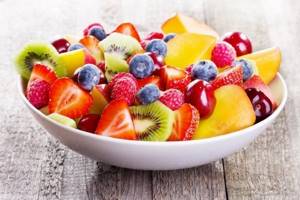
In addition to the amazing variety in appearance, smell and taste (and when it comes to delicious food, fruits are probably the first to come to mind), fruits are distinguished by the fact that they contain a large number of different vitamins and minerals, carbohydrates and fiber. Their usefulness is already known, so let’s pay attention to some features of their use. It will be beneficial if you eat the right combinations of fruits. So, apples contain a lot of fiber, but little vitamin C. But if you add an orange and strawberries to them, then your daily dose of vitamin C is provided. It’s no wonder that fruit salads are so popular these days. But a distinctive feature of fruits is that they can be consumed each as a separate dish. It is recommended to eat fruits for breakfast; they are also the best way to snack. By the way, you need to remember that fruit juices are also food (very tasty), and do not forget to drink water.
A separate topic is dried fruits. Dried fruits are well suited for long-term storage and have a higher nutrient content per unit weight. Another pleasant feature of fruits for most people is that they are used to make a large number of different sweets: preserves, jams, candied fruits, Turkish delight and others. And in themselves they serve as a delicacy for many. And it seems that it was fruits that served as the starting point for the emergence of such a category of dishes as dessert.
You can also eat many of the sweets we are used to. When choosing, pay attention only to the gelatin content. Gelatin is obtained by boiling the bones and tendons of animals, that is, it is not a vegetarian product at all. Look for candies and other tasty treats without the use of thickeners or with plant equivalents - these are Agar-Agar and Pectin.
Already at this stage, we can say that a vegetarian diet provides many opportunities for organizing nutritious nutrition, and the harm of vegetarianism is greatly exaggerated; but this is only part of the components of a vegetarian diet.
Calcium and vitamin D deficiency
Vitamin D is involved in the metabolism of calcium and phosphorus in the body, it is important for normal carbohydrate metabolism, helps reduce body weight in obesity and improve immunity. Adequate intake of vitamin D per day is about 5 mcg. The main sources for vegetarians are eggs (2.2 mcg), sour cream and butter (0.2 mcg), cream (0.1 mcg).
Calcium is involved in the formation of bone tissue and teeth, conduction of nerve impulses, muscle contraction, the functioning of the excretory system and reproductive function, as well as a number of other important processes. An adult needs 800 - 1000 mg of calcium per day (in adolescents, pregnant and lactating women, the norm is higher).
The main sources of calcium for non-strict vegetarians are dairy products: cheese (600-1000 mg), cottage cheese (154 mg), sour cream (90-120 mg), cream (86 mg). In addition, there is a lot of calcium in dark leafy green vegetables (chinese cabbage, broccoli, kale, turnips. You can also get calcium from sesame seeds and almonds (273 mg), pistachios (250 mg), beans (150 mg) , soy and soy products (such as tofu and tempeh), chia seeds, figs, mustard, garlic, hazelnuts, oatmeal, peas, walnuts and barley, and specially fortified calcium products (such as soy yogurt, soy milk and etc.).
Top 6 Important Nutrients
Below are the most necessary substances for a vegetarian that he should receive as vital microelements for the body
Calcium and vitamin D
Calcium helps build and maintain strong teeth and bones. Everyone knows that dairy products are the richest in calcium. However, vegetables such as turnips, cabbage and broccoli, as well as almonds, white beans, figs and oranges, are also rich in calcium when eaten in sufficient quantities.
Vitamin D also plays a significant role in bone health. It contains cow's and rice milk, some juices, as well as cereals and margarines.

Be sure to check food labels. If the body does not get enough fortified foods and is not exposed to the sun, a vitamin D supplement may be needed.
Vitamin B12
This vitamin is necessary for the production of red blood cells and the prevention of anemia. B12 is found most in animal foods, so it can be difficult to get enough of it in a vegetarian diet.
Deficiency may go undetected in people because vegetarian diets are rich in a vitamin called folate, which can mask vitamin B12 deficiency until serious problems arise. For this reason, it is important to include vitamin supplements, fortified grains, and soy products in your diet.
Protein
It helps maintain healthy skin, bones, muscles and all human organs in general. A sufficient amount of it is found in soy products, nuts, lentils, and legumes.
Omega-3 fatty acids
Omega-3 fatty acids are important for healthy heart function. Diets that do not include fish and eggs are usually ineffective at providing omega-3 fatty acids. Canola oil, soybean oil, walnuts, flaxseeds and soybeans are good sources of essential fatty acids.
Iron and zinc
Iron present in hemoglobin, an important protein that ensures the transport of oxygen in the blood to all human organs. Dry beans and peas, lentils, fortified cereals, whole grains, dark leafy green vegetables and dried fruits are good sources of iron. Because iron is not easily absorbed from plant sources, the recommended iron intake for vegetarians is almost double that recommended for regular people.
To help the body absorb iron, it is recommended to eat foods rich in vitamin C, such as strawberries, citrus fruits, tomatoes, cabbage and broccoli, while also consuming foods containing iron.
Zinc is an important component of many enzymes and plays a role in cell division and protein formation. Found in soy products, legumes, nuts and whole grains.
Iodine
Iodine is a major component of thyroid hormones, which help regulate metabolism, growth and functioning of organs and systems. Vegans may not get enough iodine and may be at risk of deficiency and possibly even goiter. Additionally, foods such as soybeans, cruciferous vegetables, and potatoes may contribute to the development of goiter. However, only 1/4 teaspoon of iodized salt per day provides the correct amount of iodine.
Iron and zinc deficiency
Iron is involved in many processes in the body, for example, it transports oxygen from the lungs to organs and tissues, is part of some enzymes, and fights oxidative stress. Zinc is part of more than 100 (!) enzymes, is involved in protein synthesis and in carbohydrate, mineral metabolism and the metabolism of vitamins A and E, in the transfer of electrons and in the functioning of the genetic apparatus, collagen synthesis and the building of immunity, sexual function and other important processes. The need for iron per day is 10-20 mg, for zinc – 10-40 mg.
The main sources of iron and zinc are animal products (meat and eggs). In plant foods, iron is found in bread, cereals, nuts and dried fruits, zinc is found in nuts, legumes (beans, peas, soybeans), pumpkin and sunflower seeds, and whole grains. Sources of iron in a vegetarian diet are usually sufficient, but its absorption is difficult due to the fact that the bioavailability of iron in plants is lower than in meat, and also because other components of the diet reduce the absorption of this microelement. For comparison: iron is absorbed from meat by approximately 20-30%, from fish by 10-15%, from eggs, corn and beans - by 3%, from soybeans - by 7%, from spinach and rice - by 1%.
In addition, the content of phytic acid, caffeine and tannins from tea and coffee, phosphates and oxalates reduces the absorption of iron and zinc by the body. Phytates are found in the shell of cereals, legumes and seeds and form insoluble complexes with iron in the body. Therefore, before cooking, it is recommended to soak grains and legumes in water (with the addition of soda or vinegar).
To increase the absorption of iron, it also makes sense to combine iron-containing foods with foods that are sources of vitamin C (berries, citrus fruits, sweet and hot peppers, zucchini, tomatoes, broccoli). But foods high in calcium, on the contrary, impair the absorption of iron.
Points for and against
Considering how many vegetarians there are in the world, and according to statistics there are more than a billion of them on the planet, we can safely conclude that this movement is becoming more and more popular every year. Therefore, in order to immediately debunk the myths about this type of nutrition and lifestyle, it is worth listing all the pros and cons of vegetarianism.
Arguments in favor
The following arguments can be made to convince a person to give up eating meat and follow the basics of vegetarianism:
- Plant foods contain fewer carcinogens . This has been proven in numerous studies. Those who are accustomed to regularly eating fried meat dishes are more likely to suffer from various diseases, and they are more likely to develop cancer of the digestive organs.
- This diet allows you to better control your weight. A vegetarian diet as a way to lose weight is described in many sources. Indeed, when consuming exclusively plant foods, it is easier to lose weight, since such a diet is generally lower in calories. However, not all vegetarians are thin. And even among sumo wrestlers, vegetarianism is common. Therefore, such nutrition can be called lighter. But the answer to the question of whether there are fat vegetarians is still positive.
- Plant foods are an effective prevention of the development of vascular and heart diseases. This thesis is motivated by the fact that in countries where a meat diet predominates in the diet, people are much more likely to suffer from diabetes , hypertension, and suffer from heart attacks . Also, people with a plant-based diet are less likely to experience such a terrible disease as atherosclerosis , because vegetarians have lower blood cholesterol levels.
- A vegetarian diet contains more vitamins. If the plant-milk diet is varied and balanced, then a person will be able to get all the minerals and vitamins .
- When following this diet plan, a person becomes more energetic, feels better and more cheerful. In addition, his mood improves and attacks of irritability are less frequent.
- There is an opinion that adherents of vegetarianism are less likely to suffer from colds.
Arguments against
There are several compelling arguments against following a vegetarian lifestyle:
- Considering what vegetarians eat, it should be understood that their diet lacks those minerals and vitamins that are present exclusively in meat products. We are talking primarily about iron and vitamin B12 . Even if soy and legumes are present in the diet instead of meat, they still do not satisfy all the body’s needs. As a result, in more than half of the cases, vegetarians experience anemia and iron deficiency, which leads to hair loss and brittle nails, decreased performance and loss of strength. In women, the monthly cycle may be disrupted and intestinal problems may appear.
- Foods of plant origin contain little iodine, calcium, and vitamin D. A deficiency of these substances can result in problems with the thyroid gland, problems with teeth and bones. This condition is especially dangerous for older people.
- Since vegetarian food contains a lot of plant fiber, its constant consumption leads to impaired protein absorption. This condition causes the development of muscular dystrophy, deterioration of immunity , increased risk of tuberculosis , etc.
- Pregnant women and mothers nursing babies cannot get enough of the substances they need from such food, in particular, protein, which the child needs for normal development.
- Many sources note that children under 15 years of age should not practice exclusively plant-based nutrition. Meat should be introduced into a child's complementary feeding in a timely manner to avoid the development of anemia, dystrophy, and retardation in mental and physical development. In addition, later, when the baby goes to kindergarten or attends a children's camp, he will have to give up regular food and, probably, be malnourished.
- Another disadvantage is that vegetarian food is not always available. In many cafes, shops, restaurants, hotels, it is very difficult for vegans or vegetarians to purchase food that meets all the principles of their nutritional system. Therefore, meals have to be planned in a special way.
- It is also unlikely that you will be able to save money with such food. Despite the fact that there is no need to buy meat, products that allow you to diversify your diet are quite expensive. Mushrooms, high-quality dairy products, and fruits are not a cheap pleasure.
Vitamin A deficiency
In animal products, vitamin A (retinol) is in a bioavailable form, so its absorption from these products is high. In plant foods, vitamin A is in the form of provitamins – carotene and carotenoids. Therefore, before our body can absorb vitamin A from plants, it needs to do a number of complex manipulations with it - convert it from an inactive form to an active one (including using vitamin B12). All this takes the body additional time and resources, which it may not have enough of, so vegetarians may suffer from hypovitaminosis A.
The daily requirement for vitamin A is 3300 IU (or 1000 retinol equivalents, or 1-3 mg/day). Main sources for vegetarians: wild garlic (4.2 mg per 100 g), viburnum (2.5 mg), garlic (2.4 mg), butter (0.59 mg), broccoli (0.39 mg), sour cream (0.3 mg), sweet potato or sweet potato (0.3 mg), seaweed (0.2 mg), feta cheese (0.17 mg), seaweed (0.1 mg), cottage cheese (0.08 mg).
Delicious, healthy and without meat
So, let's consider what opportunities there are to meet the body's needs for energy and “building” materials with the help of products that do not require the killing of animals. In addition, to be healthy, food must also be tasty, and the diet must be quite varied. Which is also part of our understanding of the good life. And vegetarianism can bring its own additional advantages here, due to the inclusion in the diet of a variety of products that the traditional cuisine of our region (and for it meat-eating is still largely traditional, but not only) might not pay such close attention. Although a significant part of these products are quite common and are present on the table not only of vegetarians. In any case, the vegetarian products that will be discussed are quite easy to find on store shelves or in the market.
Iodine deficiency
If you exclude seafood from your diet, there is a high risk of acquiring iodine deficiency in the body. Iodine is an important trace element that is part of thyroid hormones and is involved in the development of the brain of the fetus, children and adolescents. Iodine consumption in Russia is at a very low level, so almost all of us, regardless of whether we are vegetarians or not, are catastrophically short of iodine. Meanwhile, the need for iodine in adults is 100-150 mcg/day.
In addition to fish and sea reptiles, sources of iodine are seaweed (300 mcg) and feijoa (80-350 mcg), as well as iodized salt and special dietary supplements.
It must be borne in mind that there are products that neutralize iodine (soybeans and its derivatives, cruciferous vegetables and flaxseed). Therefore, it is better not to combine them with seaweed or other sources of iodine in the same meal.
Why is it so important to properly plan your diet?
Keep in mind that the more restrictive your diet, the more difficult it is for your body to get all the nutrients you need. This, in turn, can lead to many health problems. Ranging from nervous conditions, depression, numbness in the arms and legs, decreased performance, impaired memory and concentration to more serious conditions such as anemia, hormonal disorders, diseases of the gastrointestinal tract, digestive disorders, problems with joints, tooth enamel and many others.
Content:
- Why is it so important to properly plan your diet?
- The most common errors when planning a diet
- Top 6 Important Nutrients
- 6 Simple Ways to Become the Healthiest Vegetarian
- Preparing the right diet for every day
Most often, a vegetarian diet eliminates the natural nutritional sources of vitamin B12, which is vital for the nervous system and for the production of RNA and DNA in every cell of our body, vitamin D, which ensures the absorption of phosphorus and calcium from the small intestine, and protein, as the main building material for the body. It also excludes dairy products, which contain large amounts of vitamins and calcium, necessary for healthy bone growth.
The key to eating well and having a healthy vegetarian diet is to eat a variety of foods. After all, no food can provide all the necessary vitamins, minerals and nutrients that are simply vital to your body.
Imbalance of Omega-3 and Omega-6 PUFAs
Since the main source of omega-3 polyunsaturated fatty acids in the body is fatty marine fish, vegetarians who exclude fish from their diet are at risk for this essential fatty acid. You can read about why it is important to maintain the proportion of omega-3 to omega-6 fatty acids here .
What can be done about this? First, rely on plant sources of omega-3 PUFAs: flax seeds, chia seeds and walnuts (although, according to some information, omega-3 from plants does not have the same biological value for our body as omega-3 from fish) . And secondly, use oils with a low amount of omega-6: olive, avocado, rapeseed, flaxseed, camelina oil, hemp oil, chia seed oil (the latter, however, I have never seen on sale).
What do vegetarians eat: food list
The following groups of products that vegetarians consume can be distinguished:
- Legumes and cereals - cereals, bread, cereals, cereals, beans, peas, chickpeas, lentils, etc.
- Vegetables are green and starchy.
- Fruits, berries.
- Dairy products - if a person does not profess the principles of veganism, they are also included in the menu.
- Vegetable oils.
- Seeds and nuts.
- Seafood - seaweed.
- Herbs and spices.
Do vegetarians eat eggs?
The question of why vegetarians don’t eat eggs is very relevant. This product is consumed by ovo-vegetarians, while vegans completely abandon animal foods. The essence of their philosophy is to give up animal products for which animals are exploited. The answer to the question why vegans don’t drink milk is similar. Milk and milk products are obtained by keeping livestock in captivity, which is contrary to the ethical principles of veganism. Therefore, if you ask vegans whether adherents of this philosophy eat cheese, you will get a negative answer.
Do vegetarians eat fish?
If a person refuses meat, but still consumes fish, his diet is quite complete, and the question of what can replace meat is no longer so relevant. Fish and legumes are adequate substitutes for the protein that the body gets from meat.
However, do fish and vegetarianism go together? In fact, true vegetarians completely avoid fish, since it is an animal product. People who give up meat and still consume fish are called pescatarians. People who adhere to such principles eat not only plant foods, but also eggs, milk, fish and seafood. Their menu includes various fish - fried, boiled, salted. But for many people this stage is transitional. Reading the diary or blog of those who profess the principles of vegetarianism, you can see that after giving up meat, people only ate fish for a while, after which they became “full-fledged” vegetarians.
Diet preparation
So, we have looked at the features of a vegetarian diet, and now the main question that I think you have is: how to switch to vegetarianism and how much and what foods to eat so that the diet is balanced.
When making any changes to your diet, I recommend, firstly, not to rush and think in advance about what and how you will eat . Do you have enough suitable products in your nearest stores? Are they financially accessible, is there the necessary variety and choice of quality products that you will choose to replace products from your previous “meat” diet?
Secondly, I would advise you to get examined by a doctor and find out the state of your body - is it ready for a change in diet, are there any hidden diseases that can complicate both the transition itself and your state of health. You can take a vitamin content test to understand what resources you have and what you need to focus on. Subsequently, it is better to retake this test every six months or a year to keep the situation under control.
Thirdly, you shouldn’t rush and rush headlong into a new diet. Any change in diet is stress for the body, and stress is the worst assistant in such an important task. Therefore, once you decide to radically change your diet, especially if this is not for medical reasons, think through a transition strategy, break it into phases ranging from several weeks to several months and change your diet gradually (first replace one food group, for example, red meat, legumes, then remove poultry or fish from your diet if you want to go further in this matter). There's no need to rush! Carefully monitor how your body reacts to changes and adjust if necessary. After all, you are waiting for positive changes, not health problems, right?

As with a regular diet, a vegetarian diet should be based on whole grains. They must be combined with complementary amino acid products from legumes and soybeans, nuts and seeds to compensate for the lack of protein. As always, don’t forget about vegetables – heat-treated and raw, of which there should be at least 500 g, and preferably more. We remember, however, that starchy vegetables such as potatoes, sweet potatoes, pumpkin and boiled carrots belong more to the group of grains than vegetables, since they contain a lot of starch. Fruits - whether raw or cooked - should be included in the diet on a regular basis.
Don't forget about good fats, whose sources are olive, flaxseed, rapeseed, butter, camelina oil and avocado oil, the avocado itself, nuts and seeds. If necessary, we include omega-3 supplements in the diet. If you eat eggs and dairy products, then 1 serving of eggs and 1-2 servings of dairy products should also be in your diet every day, and if not, be sure to take a dietary supplement with vitamin B12. Don't forget about such a source of vitamin D as the sun - 10-15 minutes a day spent in the sun will help us produce it. We drink enough water and, if possible, minimize coffee and black tea, as caffeine interferes with the absorption of iron and zinc. And don't forget about regular physical activity, which allows our metabolism to remain at a higher level.
Did you like the article? I would be grateful if you share it on social media. networks with your friends.
PS: If you need individual advice, more details can be found here.
Vegetarian food for children
Healthy vegetarian food is also acceptable for children. From an early age it is useful to introduce a child to the correct principles of nutrition. Many people mistakenly believe that a child’s body cannot develop without meat. This is wrong. Vegetarian nutrition for children can be beneficial, but only if the menu is clearly balanced taking into account age standards and needs. It is best to find a pediatrician who practices a similar food culture, or a pediatric nutritionist who can give the right recommendations for creating a children's vegetarian diet.
It is important to remember that a child’s growing body especially needs vitamins and microelements. The menu for a vegetarian baby should include a wide variety of products that can provide all the body’s needs in accordance with age.
Vegetarian pyramid
If you decide to choose this path for yourself, then you will probably be interested in the vegetarian pyramid. Today, there are several versions of the vegetarian nutrition pyramid. But we will present you one - a classic variation.
It looks like this:
- 1st tier - water;
- 2nd tier - vegetables;
- 3rd tier - fruits;
- 4th tier - grains, potatoes, sweet potatoes;
- 5th tier - beans, mushrooms, soybeans;
- 6th tier - pumpkin and sunflower seeds, nuts;
- 7th tier - vegetable oils;
- 8th tier - dairy products (relevant for lacto-vegetarians).
This pyramid is a kind of template according to which you can create your own menu. Each tier shows the importance of a particular type of food for the human body. To all the listed food groups it is worth adding walks in the fresh air and sunshine. The fact is that a healthy diet will be incomplete without proper physical activity and vitamin D, which is so necessary for us, obtained from sunlight. When composing your diet and scheduling your daily routine, it is important to remember each tier of the pyramid and that healthy nutrition will be incomplete without the correct attitude to the physical culture of the body.

